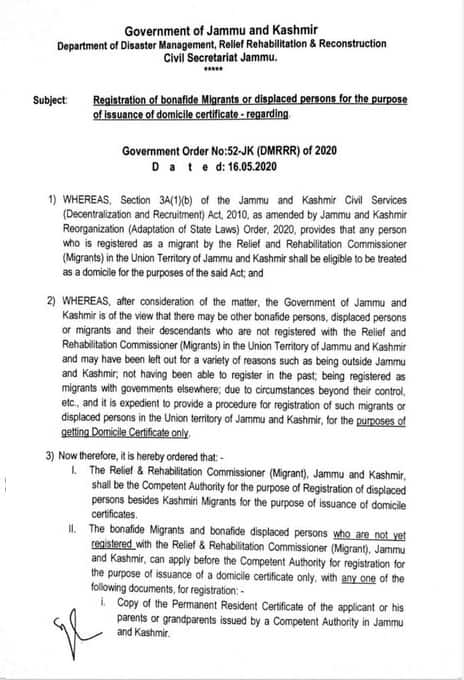J&K govt notifies domicile rules for jobs, other privileges
The Jammu & Kashmir government has issued a notification specifying the conditions for obtaining domicile certificates necessary for applying for government jobs and other privileges in the Union Territory.
Trending Photos
)
Jammu: The Jammu & Kashmir government has issued a notification specifying the conditions for obtaining domicile certificates necessary for applying for government jobs and other privileges in the Union Territory.
The new domicile rules notified on Monday replace the erstwhile J&K permanent resident rules that stood abrogated along with the abrogation of Articles 370 and 35A.

The notification has been issued in exercise of powers confirmed by Article 309 of the Constitution of India read with section 15 of the Jammu & Kashmir Civil Services (Decentralisation and Recruitment) Act, 2010.
The details of the notification were shared with the media by government spokesman Rohit Kansal at a press conference.
According to the new rules all those holding the permanent resident certificates of the erstwhile J&K state are eligible to get the domicile certificates from the designated authority which in all cases are tehsildars of different areas in J&K or other officials those may be notified by the government.

"Those in possession of the permanent resident certificates do not need any other document to get the domicile certificate. A person who has resided in the Union Territory for 15 years or studied in Jammu & Kashmir for seven years and has appeared in class 10th/12th examination in an educational institution located in Jammu & Kashmir.
"Or who is registered as a migrant by the relief and rehabilitation commissioner (Migrants) in the union territory of Jammu and Kashmir as per procedure prescribed by government for migrants and displaced persons.
"Or who is a child of central government official, all India services officers, officials of public sector undertakings and autonomous body of central government, public sector banks, officials of statutory bodies, officials of central universities and recognised research institutes of the central government who have served in the UT of Jammu & Kashmir for a total period of 10 years are eligible to get domicile certificates", the spokesman said.
He also said a child of parents who are resident outside the UT of Jammu & Kashmir in connection with their employment or business or other professional or vocational reasons but who fulfil any of the conditions described in clauses (a) or (b) of the notification are also eligible for domicile certificates.
"To make the entire process transparent the designated authority will have to issue the certificate within 15 days of receiving the application. There is also an appellate authority that will dispose off appeals against the decision of the designated authority within a period of seven days," the spokesman said.
"A designated officer shall be bound by the decision of the appellate authority failing which a penalty of Rs 50,000 will be imposed on the designated official and this will be recovered from his/her salary", Kansal said.
The process of issuing domiciles is simple transparent and fast and is explained below
1. Permanent Resident Certificate Holder: Permanent Resident Certificate:
B) Children of persons possessing Permanent Resident Certificate: Permanent Resident Certificate of the parent; and Birth certificate issued by Competent Authority
2. A person who has resided for a period of fifteen years in the Union territory of Jammu and Kashmir: Any document such as Ration Card: immovable property records: educational records: voter list: electricity utility bills: labour card; or, employer certificate verified by the Deputy Labour Commissioner or the Director Industries & Commerce of the Concerned Division; or, any other document of proof of residence
B.) Children of a person who has resided for a period of fifteen years in the Union territory of Jammu and Kashmir : Any document of the parent such as Ration Card: immovable property records: educational records: voter list: electricity utility bills: labour card; or, employer certificate verified by the Deputy Labour Commissioner or the Director Industries & Commerce of the Concerned Division; or, any other document of proof of residence and, Birth certificate issued by the Competent Authority.
3) A person who has studied for a period of seven years and appeared in class 10th/12th examination in an educational institution located in the Union territory of Jammu and Kashmir Certificate of education issued by the Head of the Institute and verified by Chief Education Officer of the School Education Department of the concerned District
4) Migrants/ Children of Migrants Certificate of registration of migrant; Or Permanent Resident Certificate, if available and Birth Certificate
5) Children of Central Government officials, All India Service Officers, Officials of Public Sector Undertakings, Autonomous Body of Central Government, Public Sector Banks, Officials of Statutory bodies, Officials of Central Universities and recognised Research institutes of Central Government who shall have served in Jammu and Kashmir for a total period of ten years Certificate of service issued by General Administration Department/Cadre Controlling Authority and Birth Certificate issued by the Competent Authority
6) West Pakistan Refugees: They were hitherto not allowed the benefit of government jobs. They were part of the Parliamentary electoral roll but not that erstwhile state electoral roll. They will now be covered under the 15 year residence rule or their children under the 7 year/ class 10/12 rule.
7) Safai Karamcharies they too were not allowed the benefit of governmentt jobs. They will now become eligible under the 15 year residence rule or their children under the 7 year/ class 10/12 rule.
8) Women (erstwhile) resident married to non residents were also not eligible so far: They will also become eligible under the PRC/ children/residency rule.
9) All other migrant and displaced persons not covered so far will also be covered under the new rules/migrant order.







)
)
)
)
)
)
)
)
)
)
